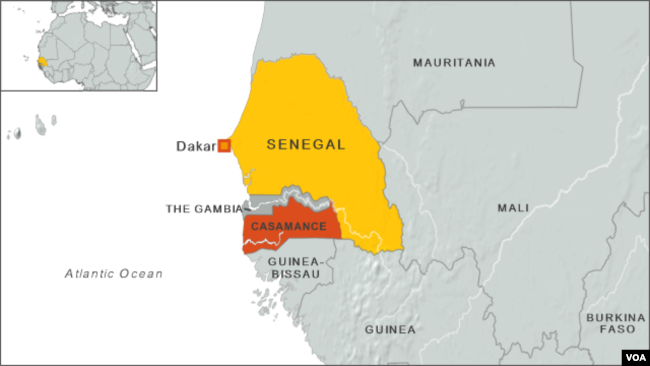
FILE - Members of the Senegalese Armed Forces walk past discarded rockets at a recently captured Movement of Democratic Forces of Casamance (MFDC) rebel base in Blaze Forest, Feb. 9, 2021.
VOA NEWS
DAKAR —
Senegal’s army has launched a new offensive aimed at dismantling a separatist rebel group in the country’s southern region, causing more than 2,000 people to flee. The military operation comes less than two months after rebels killed four Senegalese soldiers and captured seven others.
The Senegalese army began its offensive on March 13 with the aim of dismantling rebel group bases along the Gambian border. The rebels, known as the MFDC, or the Movement of Democratic Forces of Casamance, are suspected of trafficking cannabis and rosewood, which is exported to China, in order to fund their separatist movement.
As of Tuesday, the latest flare-up had left more than 2,000 people displaced.
Alasan Senghore, the secretary-general of the Gambia Red Cross Society, says this latest episode of fighting is one of the worst he’s ever seen.

DAKAR —
Senegal’s army has launched a new offensive aimed at dismantling a separatist rebel group in the country’s southern region, causing more than 2,000 people to flee. The military operation comes less than two months after rebels killed four Senegalese soldiers and captured seven others.
The Senegalese army began its offensive on March 13 with the aim of dismantling rebel group bases along the Gambian border. The rebels, known as the MFDC, or the Movement of Democratic Forces of Casamance, are suspected of trafficking cannabis and rosewood, which is exported to China, in order to fund their separatist movement.
As of Tuesday, the latest flare-up had left more than 2,000 people displaced.
Alasan Senghore, the secretary-general of the Gambia Red Cross Society, says this latest episode of fighting is one of the worst he’s ever seen.

FILE - Alasan Senghore during a Red Cross meeting about the challenges of development in Africa, Nov. 10, 2010, in Johannesburg,
"There is fear and panic because fighting happens most of the time. There’s firing of gunshots and also helicopters flying overhead,” he said.
“People are abandoning their villages to cross into The Gambia from Casamance. And those living along the border are moving further into The Gambia to seek safety,” he said.
The conflict is one of the oldest in Africa. It began in 1982 and has since claimed thousands of lives.
The region in southern Senegal is distinct from the rest of the country. Geographically, it’s separated from northern Senegal by Gambia. Historically, it was a Portuguese colony, while the rest of Senegal was colonized by the French. The region also has different religious, ethnic and linguistic traditions.

Dame Beye leads several civil society organizations in Casamance. He says the region has been relatively stable and peaceful since 2013, but now the situation is dire. He adds, people are fleeing with their children in tow, taking nearly nothing with them.
"We think that the solution is an open dialogue, because the results we achieved from 2013 to present happened because they agreed to lay down their arms and talk,” he said. “That’s the only thing that could bring peace to Casamance. Because we’ve suffered too much from this conflict.”
Senegalese President Macky Sall had made “achieving peace” in Casamance a priority for his second term in office.
"There is fear and panic because fighting happens most of the time. There’s firing of gunshots and also helicopters flying overhead,” he said.
“People are abandoning their villages to cross into The Gambia from Casamance. And those living along the border are moving further into The Gambia to seek safety,” he said.
The conflict is one of the oldest in Africa. It began in 1982 and has since claimed thousands of lives.
The region in southern Senegal is distinct from the rest of the country. Geographically, it’s separated from northern Senegal by Gambia. Historically, it was a Portuguese colony, while the rest of Senegal was colonized by the French. The region also has different religious, ethnic and linguistic traditions.

Dame Beye leads several civil society organizations in Casamance. He says the region has been relatively stable and peaceful since 2013, but now the situation is dire. He adds, people are fleeing with their children in tow, taking nearly nothing with them.
"We think that the solution is an open dialogue, because the results we achieved from 2013 to present happened because they agreed to lay down their arms and talk,” he said. “That’s the only thing that could bring peace to Casamance. Because we’ve suffered too much from this conflict.”
Senegalese President Macky Sall had made “achieving peace” in Casamance a priority for his second term in office.
No comments:
Post a Comment